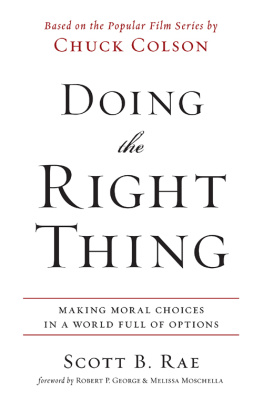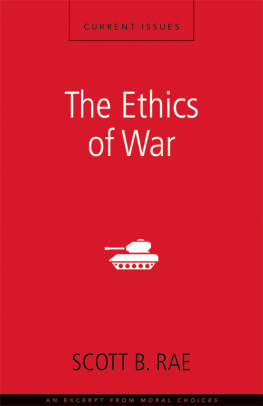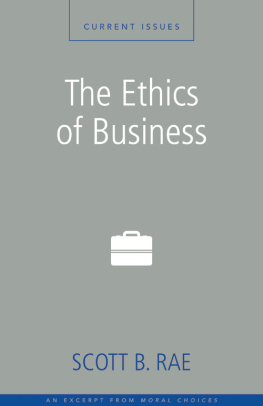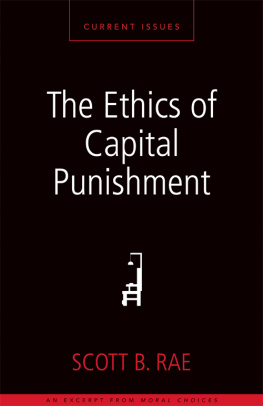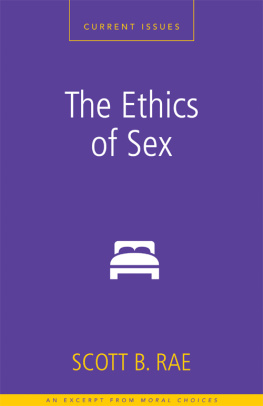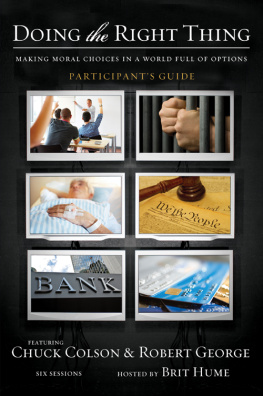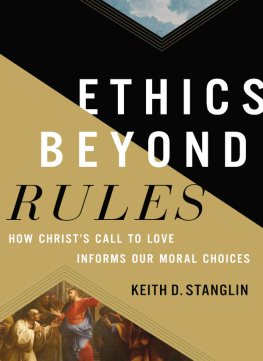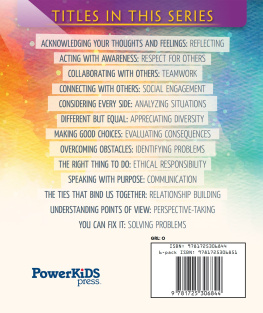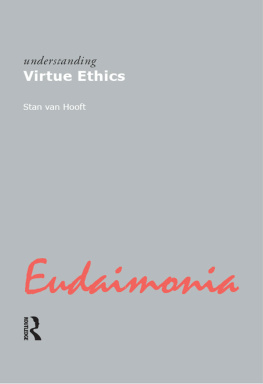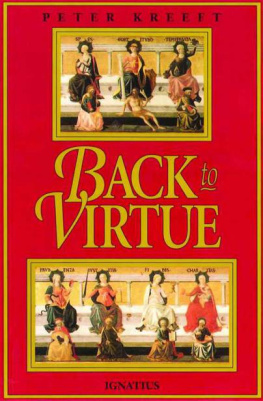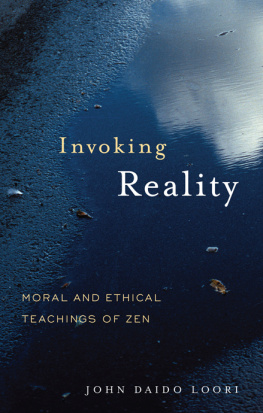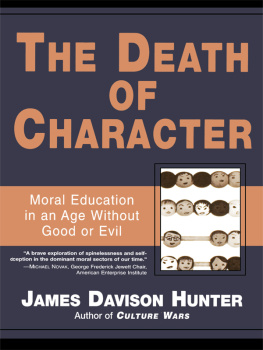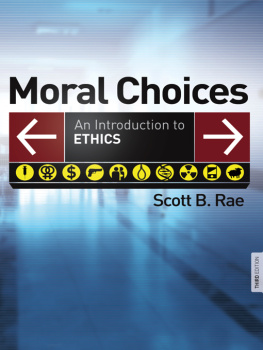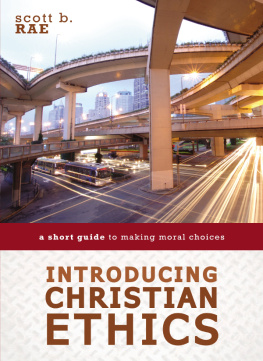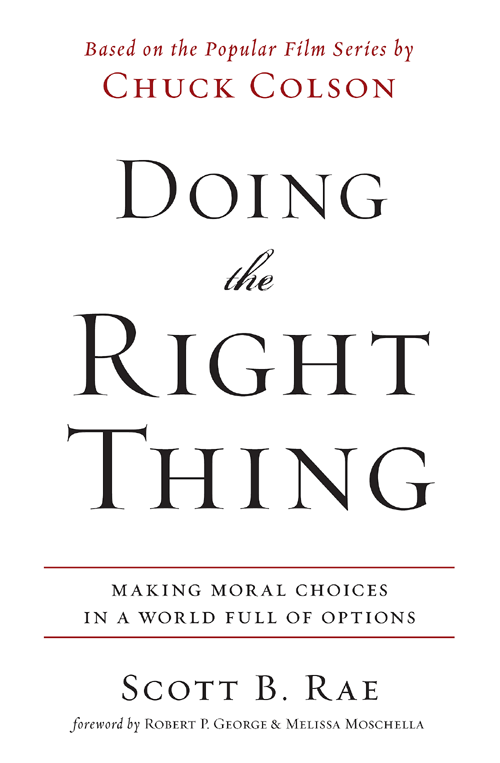S COTT B. R AE
R OBERT P. G EORGE AND M ELISSA M OSCHELLA
B e ready always with an answer to everyone who asks a reason for the hope that is in you (1 Peter 3:15). The apostle Peter addressed these words of exhortation to the Christian communities of Asia Minor living in the midst of a hostile pagan culture. Their salience for Christians in America today could not be greater. We too live in a culture starkly at odds with Christian values, and ever more aggressively so. We too are called to give witness to our faith not only with words but also with upright moral conduct even when that conduct clashes with the relativism and hedonism that surround us, and even at the risk of persecution. And we too are called to play our part in transforming our culture, bringing our laws and customs into line with the deep truth that each and every human being has inherent and equal dignity a truth revealed by God but also accessible to human reason.
To be able to live as coherent Christians in todays world, we need the intellectual tools that will enable us to determine what the right thing to do is in complex situations. Moreover, to be able to explain and defend moral truths in conversations with relatives, friends, neighbors and colleagues, and also in discussions and debates in the public square we need to speak a language that everyone, including nonbelievers, can understand. For both of these tasks, reason is indispensable. That is why this book, and the DVD series that it accompanies, are so valuable. They approach morality primarily from the perspective of natural law that is, from the perspective of what reason can tell us about which choices, actions, attitudes, and habits respect and promote human dignity and genuine human flourishing, and which do not.
Natural law is, in its most basic outlines, written by God on the human heartthats why at some level, everyone understands that things like murder, rape, and slavery are wrong. Yet not all of the requirements of natural law are so obvious. The natural laws prohibition on killing innocent human beings is evident to all but the psychopath, but the application of that prohibition to the unborn, to human embryos, and to the severely debilitated is not. Careful study and reasoning are necessary to understand and explain why abortion, embryo-destructive research, and physician-assisted suicide are wrong, reasoning of the sort found in chapter 4 of this book. Most people who accept these forms of killing as legitimate who have bought in to what John Paul II called the culture of death have simply never heard or given serious consideration to the opposing arguments. Informing ourselves and then speaking out respectfully but boldly can have a powerful effect.
Doing so, of course, requires not only knowledge, but also courage, along with a host of other virtues. Morality is not only about rules or norms although norms of upright conduct are among the most important moral truths but also involves the cultivation of a virtuous character, the formation of good habits that train our will and emotions, enabling us to know and do the good and live by valid norms that specify what it means to respect the integral human good in a constant and reliable way. It is within the family that this training in virtue primarily takes place. As Aristotle says in the Nicomachean Ethics, It makes no small difference whether we form habits of one kind or another from early youth. If we are concerned about moral decline within our cultural and its devastating effects economic collapse, political corruption, juvenile crime, out-of-wedlock pregnancy, etc. then we need to be concerned first and foremost with strengthening the institution of marriage as the foundation of healthy family life. And here too is another area in which it is crucial that Christians be capable of giving reason-based arguments to defend this vital yet beleaguered institution.
In a 1953 letter, C. S. Lewis proposes the following line of attack for the moral and religious decay he perceived in the culture of his time: For my part I believe we ought to work not only at spreading the Gospel (that certainly) but also at a certain preparation for the Gospel. It is necessary to recall many to the law of nature before we talk about God. For Christ promises forgiveness of sins: but what is that to those who, since they do not know the law of nature, do not know that they have sinned? Who will take medicine unless he knows he is in the grip of disease? Moral relativity is the enemy we have to overcome before we tackle Atheism. If these words were true in the 1950s, how much more so in our own day! Christians must fight doggedly against the moral relativism that saps the vital energy of our culture. This book and accompanying DVD series are powerful arms for the battle.
D oing the Right Thing is a companion book to the film series by the same name produced by Chuck Colson. This film series was the last great project to which Chuck devoted himself. He wanted very much to make a difference in ethics in the culture, for he believed that a society that honors religious freedom is dependent on virtue being deeply rooted in that culture. He was alarmed at the breakdown in moral standards in our country and the rise of relativism the way in which people either ignore morality or make up their own moral rules all without giving thought to the incoherence of such a way of life.
Chucks heart for ethics came in large part from his longtime study of the life of William Wilberforce, the eloquent, late-eighteenth through early-nineteenth-century British member of Parliament who gave his life to two primary goals the abolition of slavery in the British Empire and what he called the reformation of manners. By manners, he meant a reformation of ethics and morality in British culture. Life for most people in the teeming cities of the newly industrialized England in Wilberforces day was crude, as chronicled by Charles Dickens in his novels. Chuck likewise saw the decline in moral standards in the United States and produced the film series in an attempt to make a difference in the ethical landscape in our culture.
But Chucks heart for ethics did not come just from his study of the great heroes of the Christian faith like Wilberforce. It also came from his thirty-five years of work in our nations prison system. Prison Fellowship, the ministry to inmates that he founded shortly after he was released from prison for his role in the Watergate scandal, provided him with the life experience that drove his interest in ethics. After interviewing countless inmates and spending years studying the various factors that contributed to a persons incarceration, Chuck concluded that the one thing nearly all inmates had in common was not their backgrounds, family dysfunction, or poverty; it was rather that they had all made poor moral choices that ultimately landed them in prison. Of course, Prison Fellowship was about more than moral reform of inmates; it was about reaching them with the good news of Jesus Christ, which provides a moral standard and, more importantly, a Savior.
Chuck intended to write this book himself. He poured his soul into writing and producing the film series and knew this material inside and out. At one point just prior to the start of filming, he told me he was surprised at how much work and how complicated it was to produce a film, to which I replied, Now you know why Hollywood producers get paid so much! But Chuck went home to be with the Lord in the spring of 2012 before he could even begin writing the book that he wanted to accompany the film. I am delighted and honored to have been asked by the Colson Center and Zondervan to complete what was only on the drawing board when Chuck died. I was personally involved in the film series, as a panelist in episodes 4 and 5, and have had access to the various drafts of the script. In addition, I was a speaker/panelist at many of the launch conferences that accompanied the release of the film series in half a dozen major US cities. It was during these conferences and especially during the downtime that I was able to spend time with Chuck and hear his heart for a revival of ethics in our culture.

